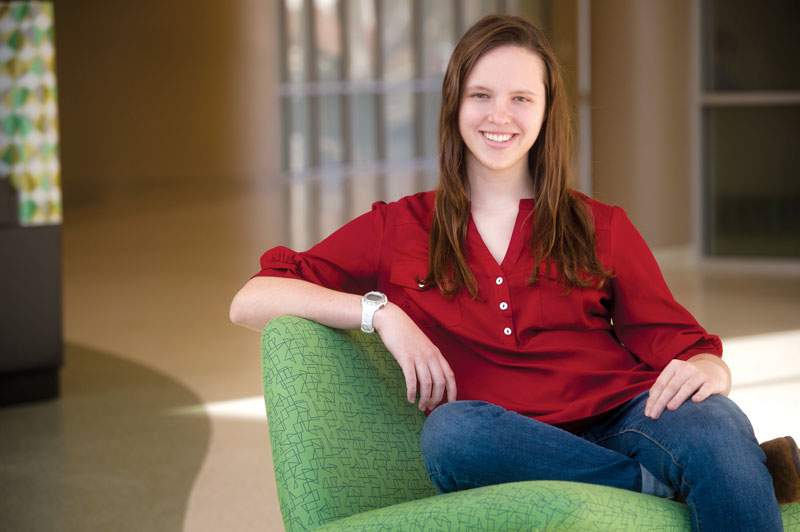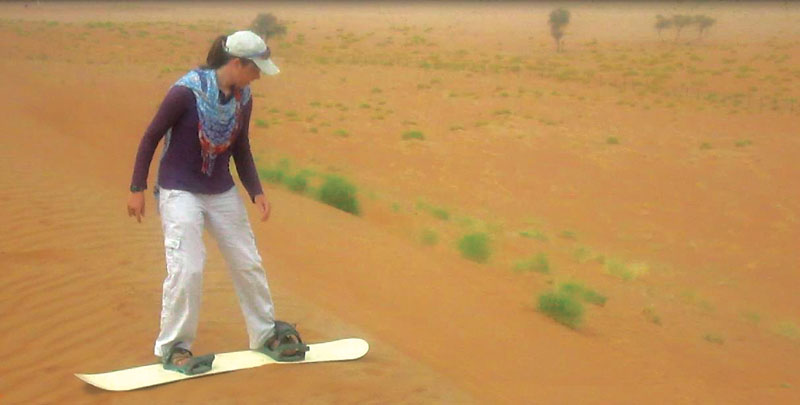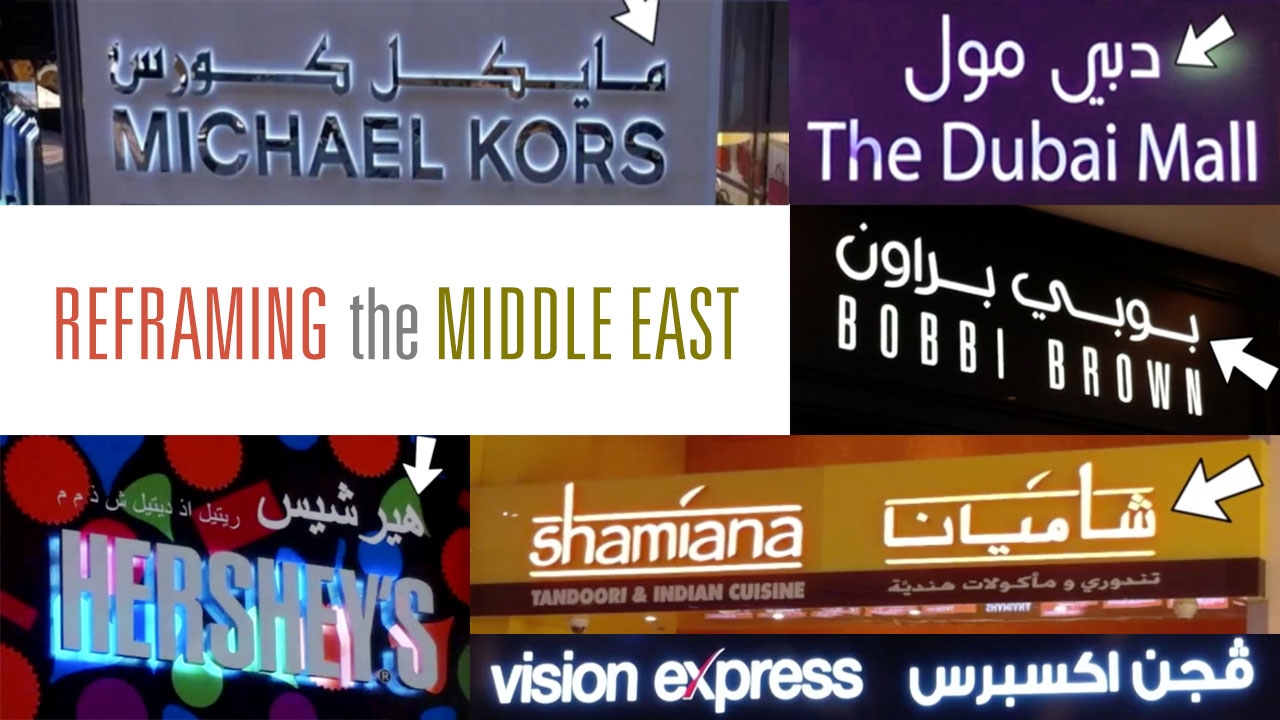With temperatures sweltering into triple digits, UAB senior Rebecca Hyde did what any college student would do in the desert. She went snowboarding.
 (Above) Through her documentaries, Hyde hopes to help Americans see the Middle East beyond the headlines. (At top) In one video, Hyde offers an introduction to the Arabic alphabet. See the full video below.
(Above) Through her documentaries, Hyde hopes to help Americans see the Middle East beyond the headlines. (At top) In one video, Hyde offers an introduction to the Arabic alphabet. See the full video below.That’s easy to do in the city of Dubai, in the United Arab Emirates, where an indoor ski park helps take the edge off the heat. If the existence of air-conditioned slopes on the Arabian Peninsula surprises you, then Hyde has a few more to share.
Through studies abroad, Hyde has immersed herself in many different aspects of Middle Eastern life in an effort to gain a nuanced understanding of the region, visiting cities, communities, and classrooms. And she has been illuminating the rich cultural complexities she has discovered in films that she hopes will encourage greater understanding between the United States and the Middle East. “I hope to help break down barriers and get more Americans positively invested in the region,” says Hyde, an international studies major and UAB Honors College student.
In particular, Hyde wants viewers to understand that no two Middle Eastern countries are alike. The Omani village where she lived bears similarities to small Alabama towns, while Dubai is like Las Vegas. “They may all be majority Islamic, but that is like trying to generalize every Christian country in Europe as having the same culture,” she says. “Recognizing those differences in the Middle East is a first step in the right direction.”
 In Oman, Hyde sandboards down a desert dune.
In Oman, Hyde sandboards down a desert dune.Shared Experiences
Hyde’s interest in Arabic culture was sparked during a high school trip to teach English in Jordan. Initially it was easy to focus on the different customs regulating dress and social interaction, says the Pensacola, Florida, native. Yet after spending time in the classroom with local women and girls, she was struck by how engaged and committed they were to learning. For Hyde, this was the moment when she realized that, as students, they had more in common than not.
She came to UAB seeking further immersive experiences. Through the UAB Honors College, she worked with mentor Ashley Floyd Kuntz, Ph.D., the college’s director of honors administration, strategic initiatives, and fellowships, as well as UAB Education Abroad to identify study opportunities.
“I applied to everything I could,” Hyde says. Her focus and determination would soon pay dividends. As a freshman, Hyde won a highly competitive scholarship through the U.S. State Department’s Critical Languages Program to study Arabic in Oman. In 2015 she followed that honor by scoring a William Jefferson Clinton Scholarship to attend Dubai’s American University.
Play the Arabic alphabet game with Hyde at Dubai Mall.
Storytelling on Screen
How can an American who hasn’t spent time in the Middle East or a Middle Easterner who hasn’t visited America develop a deeper understanding of each other’s cultures? Hyde discovered the key while taking a UAB documentary film course—which led to a minor in digital media studies.
Armed with an iPhone and a Handycam, Hyde has “strived to create short documentaries that allow subjects to tell their own stories, especially those who are often misrepresented,” she says.
While she is never sure what someone might say on camera, she is amazed at how much insight shines through. “The amount that someone will open up about something they are passionate about always blows me away,” says Hyde.
“In Dubai I created two videos—one going through the Arabic alphabet using signs from stores recognizable in the U.S., and another speaking with a Moroccan calligrapher about his art.”
While videoing the calligrapher, she learned they shared similar goals. “He said he was taking cultural action by making Arabic art for every type of person that passed by, be it Muslims, Jews, or Christians,” she recalls. “He said it makes him happy to spread his heritage, and the sign behind him read, ‘Price: Just a smile.’”
Hyde learns about the art and life of a Moroccan calligrapher.
New Frontiers
Hyde’s productions have attracted attention from the U.S. Department of State, which selected her for its 2015 Virtual Student Foreign Service program. She made short films about UAB campus life for students in Pakistan. “The goal was to show prospective students what life is like for a U.S. college student,” Hyde explains.
This summer, Hyde took her mission to space. Or, more specifically, Space Camp in Izmir, Turkey, where she served as a counselor and teacher for 9- to 15-year-olds. Hyde, who plans a public relations career focusing on Middle East policy, hopes the students at the international camp shared in the discovery that she has made time and again: What we have in common is greater than what separates us.
What’s in Your Backpack?
Whether you’re traveling to the Middle East or even across America, Hyde suggests three essential items that always come in handy:
• Always have a scarf. Much like in Hitchhikers Guide to the Galaxy, you can use it as a towel, head cover, blanket, dust mask, rope, something to sit on, and so forth.
• Always carry water, with preferably a little extra for those around you. You can never be sure if water will be clean, free, or available at all.
• Google Maps is a useful app when going off the grid. Plan your route when you have wi-fi, and then save the map so it is available offline. It’s handy for showing a taxi driver where to go or to see where you are walking.
• Discover all the opportunities for learning and experience offered by the UAB College of Arts and Sciences international studies and media studies programs, the UAB Honors College, and UAB Education Abroad.


